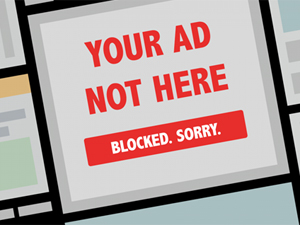



Date:02/06/17
 Starting early next year, Google's Chrome web browser will automatically block some of the most annoying and intrusive internet advertisements, including those that automatically play audio or prevent you from viewing a web page.
Starting early next year, Google's Chrome web browser will automatically block some of the most annoying and intrusive internet advertisements, including those that automatically play audio or prevent you from viewing a web page.
Google is a member of the Coalition for Better Ads, which recently published guidelines to convince advertisers to stop using annoying ad formats. Google will design Chrome's ad blocker to filter out ads that don't meet those guidelines, the company announced on Thursday.
"In dialogue with the Coalition and other industry groups, we plan to have Chrome stop showing ads (including those owned or served by Google) on websites that are not compliant with the Better Ads Standards starting in early 2018," Google Vice President of Ads & Commerce Sridhar Ramaswamy wrote in a blog post. Rumors of the blocker first surfaced last month.
Ramaswamy didn't offer more details about how the ad blocker would work or whether users would be able to deactivate it, but he hinted that the new feature will be similar to how Chrome currently deals with other internet annoyances, like blocking pop-ups in new tabs. There are currently four types of desktop ads and eight types of mobile ads that the Coalition deems unacceptable and that Chrome will likely block, ranging from ads that cover more than 30 percent of a website to large "sticky" ads that remain covering a portion of the page even when a user scrolls through it.
While it might seem counterintuitive that Google would move to block ads—no matter how annoying they are—from its own network in its own web browser, the company has concluded that doing so is the best way to curb the rise of third-party blockers that remove all ads, not just those that are intrusive.
"These frustrating experiences can lead some people to block all ads—taking a big toll on the content creators, journalists, web developers and videographers who depend on ads to fund their content creation," Ramaswamy wrote.
Built-In Chrome Ad Blocker Coming Early 2018
 Starting early next year, Google's Chrome web browser will automatically block some of the most annoying and intrusive internet advertisements, including those that automatically play audio or prevent you from viewing a web page.
Starting early next year, Google's Chrome web browser will automatically block some of the most annoying and intrusive internet advertisements, including those that automatically play audio or prevent you from viewing a web page.Google is a member of the Coalition for Better Ads, which recently published guidelines to convince advertisers to stop using annoying ad formats. Google will design Chrome's ad blocker to filter out ads that don't meet those guidelines, the company announced on Thursday.
"In dialogue with the Coalition and other industry groups, we plan to have Chrome stop showing ads (including those owned or served by Google) on websites that are not compliant with the Better Ads Standards starting in early 2018," Google Vice President of Ads & Commerce Sridhar Ramaswamy wrote in a blog post. Rumors of the blocker first surfaced last month.
Ramaswamy didn't offer more details about how the ad blocker would work or whether users would be able to deactivate it, but he hinted that the new feature will be similar to how Chrome currently deals with other internet annoyances, like blocking pop-ups in new tabs. There are currently four types of desktop ads and eight types of mobile ads that the Coalition deems unacceptable and that Chrome will likely block, ranging from ads that cover more than 30 percent of a website to large "sticky" ads that remain covering a portion of the page even when a user scrolls through it.
While it might seem counterintuitive that Google would move to block ads—no matter how annoying they are—from its own network in its own web browser, the company has concluded that doing so is the best way to curb the rise of third-party blockers that remove all ads, not just those that are intrusive.
"These frustrating experiences can lead some people to block all ads—taking a big toll on the content creators, journalists, web developers and videographers who depend on ads to fund their content creation," Ramaswamy wrote.
Views: 310
©ictnews.az. All rights reserved.Similar news
- Azerbaijani project to monitor disease via mobile phones
- Innovative educational system to be improved under presidential decree
- NTRC prolongs license of two TV and radio organizations for 6 years
- Azerbaijan establishes e-registry for medicines
- Azerbaijani museum introduces e-guide
- Nar Mobile opens “Nar Dunyasi” sales and service center in Siyazan city
- International conference on custom electronic services held in Baku
- OIC secretary general to attend COMSTECH meeting in Baku
- Azerbaijan develops earthquake warning system
- New law to regulate transition to digital broadcasting in Azerbaijan
- Azerbaijani State Social Protection Fund introduces electronic digital signature
- Intellectual traffic management system in Baku to be commissioned in December
- Tax Ministry of Azerbaijan started receiving video-addresses
- World Bank recommends Azerbaijan to speed up e-service introduction in real estate
- Azerbaijan to shift to electronic registration of real estate





















